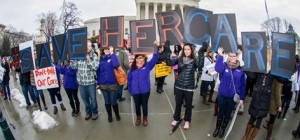by Amber Burkhart, Health Policy Fellow
How has the ACA benefited women?
Prior to the Affordable Care Act (ACA), women have struggled to attain comprehensive and affordable health insurance. Women often faced discrimination when applying for health insurance by being denied coverage or charged higher premiums due to their gender. With the passage of the ACA, which ensures guaranteed issue and prohibits gender discrimination, access to health care services for women has significantly increased.
 Not only are women guaranteed coverage at more affordable costs, but the ACA also covers more services that benefit women’s health. Women now have access to preventative care services without cost-sharing, including a full range of FDA-approved contraceptive methods and contraceptive counseling, well-women visits, breastfeeding support, domestic violence counseling and more. In addition, all marketplace health plans must cover essential health benefits, which include maternity and newborn care, pediatric services and mental health counseling. Shockingly, only 12 percent of health plans covered maternity care prior to ACA implementation.
Not only are women guaranteed coverage at more affordable costs, but the ACA also covers more services that benefit women’s health. Women now have access to preventative care services without cost-sharing, including a full range of FDA-approved contraceptive methods and contraceptive counseling, well-women visits, breastfeeding support, domestic violence counseling and more. In addition, all marketplace health plans must cover essential health benefits, which include maternity and newborn care, pediatric services and mental health counseling. Shockingly, only 12 percent of health plans covered maternity care prior to ACA implementation.
What does King v. Burwell mean for women’s access to health care?
On March 4, the Supreme Court heard oral arguments in the King v. Burwell case. This case threatens to eliminate financial assistance when buying health insurance through the federal health insurance marketplace (Healthcare.gov), a move that would affect millions of consumers in approximately three-dozen states.
Women in particular have a huge stake in the King v. Burwell decision because they make up 55 percent of all individuals enrolled in the federal marketplace. In 2014, close to 3 million women enrolled in private health insurance through the federally facilitated marketplace.
An analysis from the National Women’s Law Center (NWLC) found that 7 million women qualify for financial assistance through the federally facilitated marketplace. This means that nearly 7 million women are at risk of losing access to affordable health insurance if the Supreme Court does not vote to uphold access to the subsidies. NWLC also found that women of color are disproportionately disadvantaged making up 50 percent (approximately 3.4 million) of the 7 million women. This includes:
- 1.8 million Latinas
- 1.1 million African American women
- 250,000 Asian women,
- 106,000 Native American women
In addition, over 2 million of the women at risk live in just two states. In Texas, there are over 1.2 million women and in Florida over 900,000 are at risk of losing affordable health insurance.
King v. Burwell would undermine the great efforts the ACA has made to increase access to quality, affordable health care. Women all over the nation should be able to get the health insurance coverage and care they need, when they need it.
So what does this mean for Colorado women?
Colorado took the initiative to establish our own state-based marketplace, Connect for Health Colorado. Yet, if the court strips away financial assistance for consumers on the federal marketplace, it would throw the entire health care system into chaos, potentially affecting consumers and health care providers across the country. Thanks to Colorado’s hard work however, Colorado women are more protected against losing access to the health care they need.
Want to see more about King v. Burwell and women’s health? Check out #SaveHerCare and #DontDenyUs on Twitter.
